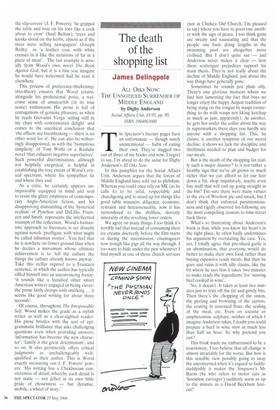The death of the shopping list
James Delingpole
ALL OIKS NOW: THE UNNOTICED SURRENDER OF MIDDLE ENGLAND by Digby Anderson Social Affairs Unit, .0.95, pp. 95, ISBN 1904863000 The Spectator's literary pages have an unfortunate — though surely unintentional — habit of eating their own. They've slagged two out of three of my books and now, I regret to say, I'm about to do the same for Digby Anderson's All Oiks Now.
In this pamphlet for the Social Affairs Unit, Anderson argues that the forces of Middle England have sold out to plebdom. Whereas you could once rely on ME (as he calls it) to be solid, respectable and churchgoing and to stand up for things like good table manners, diligence, economy, restraint and heterosexuality, now it has surrendered to the shiftless, slovenly amorality of the revolting lower orders.
We agree on many things. I too think it's terribly sad that instead of consuming their ice creams discreetly before the film starts or during the intermission, cinemagoers now trough like pigs all the way through. I too want to hide under the pew whenever I find myself at one of those church services
(not at Chelsea Old Church, I'm pleased to say) where you have to greet one another with the sign of peace. I too think gyms are sweaty and nauseating and that the people one finds doing lengths in the swimming pool are altogether more civilised. But I don't quite see — and Anderson never makes it clear — how these scattergun prejudices support his main thesis. They're not really about the decline of Middle England, just about the way things have generally gone.
Sometimes he sounds just plain silly. There's one glorious moment where we find him lamenting the fact that boys no longer enjoy the happy August tradition of being stung on the tongue by wasps (something to do with wasps not liking ketchup as much as jam, apparently). At another, he gets hot under the collar about the way in supermarkets these days you hardly see anyone with a shopping list. This, he claims, is another symptom of our moral decline: it shows we lack the discipline and thriftiness needed to plan and budget for our meals.
But is the death of the shopping list really such a major disaster? Is it not rather a healthy sign that we've all grown so much richer that we can afford to let our hair down a bit, shop impulsively, maybe even buy stuff that will end up going straight in the bin? I'm sure there were many virtues in the era of Woolton pie and snoek, but I don't think that enforced parsimoniousness and rigidly observed list-following are the most compelling reasons to time-travel back there.
What's so frustrating about Anderson's book is that, while you know his heart's in the right place, he often badly undermines his argument by overstating the case. Yes, yes, I totally agree that pre-sliced garlic is an abomination, that everyone would do better to make their own food rather than buying expensive ready meals. But then he goes and ruins it with silly claims, like the bit where he says that it takes 'two minutes to make ready the ingredients' for 'stewing beef cooked in wine'.
No, it doesn't. It takes at least two minutes just to trim off the fat and gristly bits. Then there's the chopping of the onion, the peeling and browning of the carrots, the coating in seasoned flour, the sealing of the meat, etc. Even on cocaine or amphetamine sulphate, neither of which I imagine Anderson takes, I doubt you could prepare a beef in wine stew in much less than half an hour. So why pretend you can?
This book made me embarrassed to be a reactionary. I too believe that all change is almost invariably for the worse. But how is this sensible view possibly going to sway the unconverted when it's argued so fuddyduthlyishly it makes the Simpsons's Mr Burns (he who refers to motor cars as `horseless carriages') suddenly seem as up to the minute as a David Beckham haircut?


































































 Previous page
Previous page